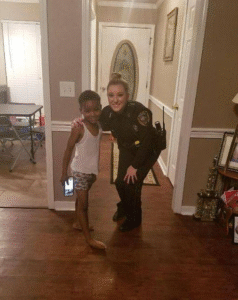In an unexpected and heartwarming turn of events, a young boy’s call to 911 because he was hungry led to an officer doing much more than just responding to an emergency. The incident began when a young child, reportedly alone at home and feeling the pangs of hunger, picked up the phone and dialed 911—not out of danger, but because he didn’t know what else to do. The voice on the other end was that of a 911 dispatcher who listened carefully and soon realized this wasn’t a prank or a misdial—it was a genuine cry for help from a child in need.
Shortly after, an officer was dispatched to the residence to check on the welfare of the child. When she arrived, she found the boy safe but clearly hungry and uncertain of how to get himself food. According to reports, there was no immediate threat, no criminal activity—just a young boy, likely confused and scared, doing the only thing he thought would help: calling for assistance.
Moved by the innocence of the situation and the boy’s honesty, the officer didn’t just file a report or alert social services—she went above and beyond. After ensuring the boy was otherwise safe, she decided to take matters into her own hands. She went out, bought him food, and brought it back to him. Her gesture was small but powerful: a warm meal and a warm heart in a moment when the child had no one else to turn to.
The story quickly spread on social media and in local news outlets, resonating with people around the country. Many praised the officer’s compassion, noting that while her job was to ensure safety, her humanity made an even greater impact. People expressed gratitude that the child’s plea didn’t go unheard, and that the response came from someone who recognized the situation not just as a call, but as an opportunity to show kindness.
This incident highlights the complex realities that children in difficult circumstances face. Sometimes, when parents are working long hours, absent, or otherwise unable to care for their children, young ones are left to fend for themselves. Hunger, loneliness, and confusion can lead them to do things that seem unusual to adults—like calling 911 for a meal. And yet, in doing so, they reveal something important: a desperate need not only for food but for attention, care, and support.
The officer’s actions also sparked discussions about the broader role of law enforcement in communities. While much of the public dialogue in recent years has centered around reform, accountability, and training, this story served as a reminder that officers can—and often do—make a positive difference in people’s lives beyond law enforcement duties. By simply choosing to act with compassion, this officer became a symbol of hope in a world where many feel isolated or unseen.
Experts weighed in on the situation, emphasizing the importance of community support systems and early intervention. They noted that a child resorting to calling emergency services for food underscores the need for stronger social safety nets. Schools, community centers, and local programs play a crucial role in ensuring that children don’t fall through the cracks. But often, these systems are overwhelmed or underfunded, leaving vulnerable children like the boy in this story at risk.
While authorities did not release the child’s name or specific details to protect his privacy, they confirmed that steps were being taken to ensure his continued well-being. Child welfare services were notified, and follow-up visits were reportedly conducted to assess the family’s situation and provide additional support if needed.
The officer, when later interviewed, expressed that she was simply doing what felt right. “I saw a child who needed help,” she said. “Sometimes we just have to be human first. I couldn’t leave him hungry.” Her humble words struck a chord with many readers and viewers who were touched by her simple, compassionate response.
The public reaction was overwhelmingly positive. People sent messages of gratitude, offered to donate to food assistance programs, and called for more support for first responders who face unpredictable situations every day. The story was shared widely on social media, with users praising the officer’s empathy and the reminder that sometimes a small act of kindness can make a big difference.
Parents also took the opportunity to talk to their children about emergencies, ensuring they understand when and how to use 911. Educators used the moment to discuss compassion and community support in classrooms. It became a teachable moment—not just about emergency services, but about empathy and the power of doing something kind for someone else.
As the story continued to gain traction, some community members began organizing efforts to support local food banks and children’s programs. Inspired by the boy’s simple plea and the officer’s kind response, people wanted to make sure that no child in their town would go hungry or feel the need to call 911 because of it.
In the end, the story of a hungry child and a caring officer serves as a poignant reminder that kindness matters. It reminds us that while systems and institutions are important, it is often the personal choices of individuals—the decision to act with heart—that truly change lives. One small act, one meal, one kind word can ripple outward in ways we might never expect. And sometimes, being a hero doesn’t require a badge or a title—just the willingness to care.


